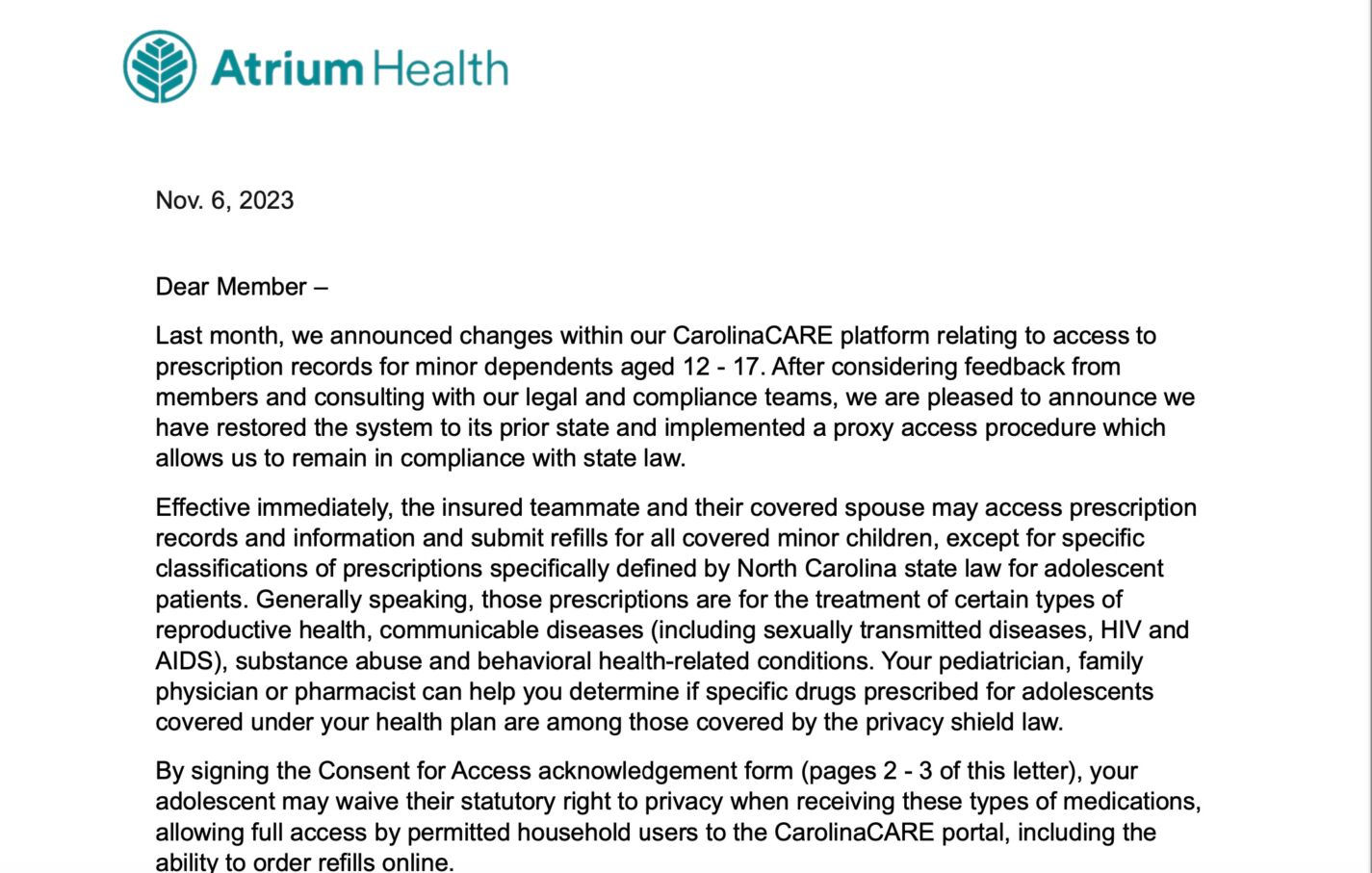Atrium Health has reversed a new policy it recently implemented that would block parents from having access to their children’s prescription records.
The policy, which took effect on Nov. 1, denied parents of children ages 12-17 access to their child’s prescriptions on CarolinaCARE, a home-delivery pharmacy service available to Atrium Health employees and their family members enrolled in the Atrium Health LiveWELL and Blue Ridge Healthcare health plans.
Last month, Atrium said in a letter to parents that they were making the change because they need to remain compliant with laws in all of the states that CarolinaCARE serves and that those states have varying laws regarding access to health information, including prescriptions.
The letter stated, “The laws are intended to allow minors to receive prescription medication for sensitive issues without worrying about how their parents may react. This may include treatment for sexually transmitted diseases and other diseases that must be reported to the state; pregnancy, drug or alcohol abuse; and mental health. We protect the privacy of the minor and follow state law by limiting access to the child’s CarolinaCARE record.”
In the new letter recently sent to parents, Atrium said, “After considering feedback from members and consulting with our legal and compliance teams, we are pleased to announce we have restored the system to its prior state and implemented a proxy access procedure which allows us to remain in compliance with state law. Effective immediately, the insured teammate and their covered spouse may access prescription records and information and submit refills for all covered minor children, except for specific classifications of prescriptions specifically defined by North Carolina state law for adolescent patients.”
The letter goes on to say, “Generally speaking, those prescriptions are for the treatment of certain types of reproductive health, communicable diseases (including sexually transmitted diseases, HIV and AIDS), substance abuse, and behavioral health-related conditions. Your pediatrician, family physician, or pharmacist can help you determine if specific drugs prescribed for adolescents covered under your health plan are among those covered by the privacy shield law.”
Atrium also said that by signing the Consent of Access form in the letter, adolescents may waive their statutory right to privacy when receiving those types of medications. If the child elects not to sign the consent form, any protected prescriptions, as defined by the law, will not be displayed and must be managed through the automated phone system.
When asked for comment, a spokesperson for Atrium said in an emailed statement to Carolina Journal that the letter sent to their members serves as their comment.
Tami Fitzgerald, executive director of the NC Values Coalition, told CJ in a telephone interview Thursday that while she is glad that Atrium changed course on its decision to allow parents access to their children’s prescription records, they haven’t changed their policy on allowing parents access to their children’s medical records.
“I don’t believe the policy has been reversed on the medical records, and that would be my hope, that they will reverse their policy on medical records as well as prescription drugs,” she said.
Fitzgerald, who is also a lawyer, said the bigger issue is the statute, which has been in effect since the 1970s and allows children to consent to treatment for high-risk behaviors and needs to be repealed.
“Parents should absolutely have the right to know about any kinds of diagnosis, treatments, or prevention that are employed on these types of medical issues, and we’re talking about high-risk behaviors like pregnancy, STD’s, drug and alcohol treatment, and mental disorders and so parents’ ought to be the ones who have knowledge and the ability to consent to treatment on these issues, not the children.”
Fitzgerald said last month that even though the General Assembly passed a Parents’ Bill of Rights in August, SB 49, the previous action taken by Atrium didn’t violate that.
“The Parents’ Bill of Rights does require parental consent for treatment, but this deals with the disclosure of medical records,” Fitzgerald said. “I do believe that parental rights are a fundamental right, and parents have a fundamental right under our US Constitution, as well as the state constitution, to oversee the healthcare and education and upbringing of their children.”
Fitzgerald said the record of treatment would be different from the treatment itself, with treatment including the administration of drugs specifically, and admits that this is a gray area or a fine line between what can be revealed, according to the PBR, and what can’t.
“What you’re talking about here is the disclosure of the healthcare record, so it’s in a gray area in the technical legal sense,” she said. “If you wanted to cover this situation, that bill should have specifically covered it, but it doesn’t.”
Fitzgerald mentioned an interesting scenario involving HB 808, Gender Transition Minors, which passed in August, and this new action taken by Atrium. The bill makes it unlawful for a medical professional to perform a surgical gender transition procedure on a minor or to prescribe, provide, or dispense puberty-blocking drugs or cross-sex hormones to a minor without the consent of a parent, She said one of the best ways to check on that from the standpoint of being prescribed puberty blockers or cross-sex hormones is the medical record of the child.
“If the child is being treated by a physician for medical transitioning, the best way for the parent to know would be the medical records,” she said. “So, it just makes it easier for medical professionals to basically not follow the law that prohibits medical transitioning.”
.
